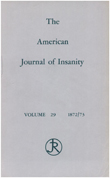Low urinary cortisol excretion in Holocaust survivors with posttraumatic stress disorder
Abstract
OBJECTIVE: The authors' objective was to compare the urinary cortisol excretion of Holocaust survivors with posttraumatic stress disorder (PTSD) (N = 22) to that of Holocaust survivors without PTSD (N = 25) and comparison subjects not exposed to the Holocaust (N = 15). METHOD: Twenty-four-hour urine samples were collected, and the following day, subjects were evaluated for the presence and severity of past and current PTSD and other psychiatric conditions. RESULTS: Holocaust survivors with PTSD showed significantly lower mean 24-hour urinary cortisol excretion than the two groups of subjects without PTSD. Multiple correlation analysis revealed a significant relationship between cortisol levels and severity of PTSD that was due to a substantial association with scores on the avoidance subscale. CONCLUSIONS: The present findings replicate the authors' previous observation of low urinary cortisol excretion in combat veterans with PTSD and extend these findings to a non-treatment-seeking civilian group. The results also demonstrate that low cortisol levels are associated with PTSD symptoms of a clinically significant nature, rather than occurring as a result of exposure to trauma per se, and that low cortisol levels may persist for decades following exposure to trauma among individuals with chronic PTSD.
Access content
To read the fulltext, please use one of the options below to sign in or purchase access.- Personal login
- Institutional Login
- Sign in via OpenAthens
- Register for access
-
Please login/register if you wish to pair your device and check access availability.
Not a subscriber?
PsychiatryOnline subscription options offer access to the DSM-5 library, books, journals, CME, and patient resources. This all-in-one virtual library provides psychiatrists and mental health professionals with key resources for diagnosis, treatment, research, and professional development.
Need more help? PsychiatryOnline Customer Service may be reached by emailing [email protected] or by calling 800-368-5777 (in the U.S.) or 703-907-7322 (outside the U.S.).



